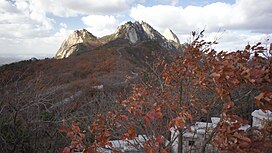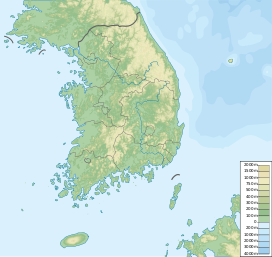
Back Bukhansan CEB بوکانسان FA Pukhanszan Hungarian Gunung Bukhan ID Bukhansan Italian 北漢山 Japanese 북한산 Korean Bukhansan LLD Bukhan-san Polish Bukhansan Portuguese
| Bukhansan | |
|---|---|
 The three peaks of Bukhansan | |
| Highest point | |
| Elevation | 836.5 m (2,744 ft)[1] |
| Listing | Mountains of Korea |
| Coordinates | 37°39′39″N 126°59′36″E / 37.6608°N 126.9933°E |
| Geography | |
| Country | South Korea |
| Climbing | |
| Easiest route | from Bukhansan Ui Station(북한산우이) then walk 2.29km to Bukansan National Park Visitor Center(북한산국립공원백운탐방지원센터) |
| Korean name | |
| Hangul | 북한산 |
| Hanja | |
| Revised Romanization | Bukhansan |
| McCune–Reischauer | Pukhansan |
Bukhansan, alternatively Pukhan-san[2] (Korean: 북한산, lit. 'North Han Mountain'), or Bukhan Mountain, is a mountain on the northern periphery of Seoul, South Korea. There are three major peaks, Baegundae 836.5 meters (2,744 ft), Insubong 810.5 meters (2,659 ft), Mangyeongdae 787.0 meters (2,582.0 ft).[1] Because of its height and the fact that it borders a considerable portion of the city, Bukhansan is a major landmark visible from most city districts. The name "Bukhansan" means "mountain north of Han River", referring to the fact that it is the northern border of the city.[3] During the Joseon era, the peaks marked the extreme northern boundary of Seoul.
Bukhansan is the highest mountain within Seoul city boundaries. Apart from Bukhansan, there are seven other mountains including Dobongsan and Suraksan that are over 600 metres high within the city.[4]
Popular throughout the year, Bukhansan, and Bukhansan National Park, which was formed in 1983,[5] are renowned for birdwatching, hiking and rockclimbing. Bukhansan attracts a large number of hikers; around 5 million per year.
- ^ "Pukhan-san : Climbing, Hiking & Mountaineering : SummitPost". www.summitpost.org. Retrieved 2024-10-21.
- ^ "Bukhansan National Park (Dobong) (북한산국립공원(도봉 지구))". Korea Tourism Organization. Archived from the original on 28 September 2013. Retrieved 27 February 2015.
- ^ "Best Hiking Mountains in Seoul". Visit Korea. Archived from the original on 23 January 2012. Retrieved 17 November 2012.
- ^ "Introduction to Bukhansan". Korea National Park Service. Archived from the original on 17 November 2015. Retrieved 27 February 2015.
